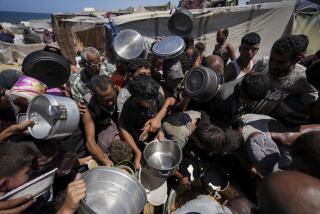Foreigners Flee Tehran as Iraq Warns Aircraft
- Share via
Hundreds of foreigners, worried by Iraq’s threat to attack any aircraft in Iranian airspace, fled from Tehran on Tuesday aboard special evacuation flights organized by their nations’ airlines.
According to the airlines, more than 800 foreigners were flown out of the Iranian capital, which has been struck repeatedly by Iraqi bombs and air-launched missiles. One Austrian airliner was forced to delay its takeoff from Tehran’s Mehrabad International Airport for 30 minutes when an air raid alert sounded and Iranian anti-aircraft guns fired, the pilot said.
Iraq had set a deadline of Tuesday night, warning all air traffic to avoid Iranian airspace or risk being shot down.
Most of those evacuated were West Europeans. There were no reports of any Americans in the airlift. Only a handful of U.S. citizens have remained in Tehran since the January, 1981, release of 52 American hostages held by Iranian militants for 14 months.
Baghdad Hit Again
The evacuations occurred as another explosion rocked Baghdad, only minutes after Iran said it had fired a ground-launched missile at the Iraqi capital.
Reporting that the non-nuclear missile slammed into “an industrial point in the heart of Baghdad,” Iran’s official news agency warned that Iran will “inflict more crushing blows on Baghdad to turn this city into ruins.”
Iraq had no comment on the explosion, but witnesses said the blast, the fourth in six days, was near the main office of the ruling Arab Baath Socialist Party and badly damaged several houses. Diplomats said at least 11 people were killed.
Baghdad lies about 80 miles from the Iranian border. Iran is not knmwn to have missiles with the range to hit it, but diplomats speculate that the Iranians may have bought longer-range missiles from Libya.
Iraq’s official news agency reported air raids on five Iranian cities, including Ardabil near the Caspian Sea and Bushehr on the Persian Gulf. Tehran radio reported that Iraqi warplanes raided the cities of Hamadan, Khorammabad and Bushehr, wounding eight people.
“Iraq will continue hitting . . . until the rulers of Iran accept peace,” the Iraqi news agency said.
Meanwhile, on the southern front, Iraqi military commanders took journalists on a tour of the area and said their troops have driven the Iranian invasion force from the border marshes except for the area around oil-rich Majnoon Island, which the Iranians also had seized in a similar offensive in February, 1984.
Iran sent an invasion force into the Hawizah marshes early last week in an attempt to cut the main north-south highway and isolate the strategic port city of Basra from the rest of Iraq.
On their tour of Hawizah--a 1,158-square-mile marshland straddling the southern border with Iran--the journalists saw no signs of Iranian troops.
‘Counter-Plan’ Prepared
The Iraqi chief of staff, Gen. Abdul-Jawad Zanoun, told the reporters that Iraq had expected the invasion and had prepared a “counter-plan to contain and destroy the thrust.”
Speaking to reporters at his command post near the town of Uzayr on the Basra-Baghdad highway, Zanoun said that on March 11, the Iranians landed eight divisions of 13,000 men each on the west bank of the Tigris River in an attempt to cut the highway at Uzayr.
“They erected a number of pontoon bridges in the marshes and across the river,” the general said. The invaders managed to hold the area for a “short time . . . but we took it back and wiped them out,” he said, adding, “The Iranians were never on the highway.”
Iraqi soldiers conceded that there still were “some isolated pockets” of Iranian resistance in tiny reed isles scattered about the shallow waters between the Iraqi and Iranian sides of Hawizah.
‘We Would Use It’
Gas masks were among the purported Iranian military booty lined up for the reporters’ inspection at the Uzayr command post. Gen. Sultan Hashim, identified as the commander of Iraqi forces “east of Tigris,” was asked if Iraq had used chemical weapons. “We did not use any because we do not have any,” he replied. “If we had some, we would use it.”
Iran and Iraq escalated the 4 1/2 year-old Persian Gulf War this month with missile and air raids on each other’s cities, breaking a U.N.-mediated truce banning attacks on civilian targets.
Air Attack Warning
Iraq warned Sunday that as of 8 p.m. local time Tuesday, any plane entering Iranian airspace might come under Iraqi attack.
In response, Iran warned that Iraq can “count on . . . powerful missile attacks on the Baghdad airport” if Iraq carries out its threat.
In Vienna, some of those evacuated from Tehran identified themselves as Austrians, Romanians, Yugoslavs, Hungarians and Britons. Many said they were dependents of diplomats.
“I am glad to be out,” Adolf Oberleuthner, Tehran station manager for Austrian Airlines, said on his arrival. “I have had enough. We have just had our 60th bomb attack in a week. It’s too dangerous for the moment to fly planes in.”
Oberleuthner said those who could manage have been spending the nights in cellars for the past several days. The airline brought all its Austrian employees out.
The evacuations were carried out despite the fact that most foreign airlines have suspended regular flights into Iran because of the stepped-up fighting. Some have also canceled flights to Baghdad.
West Germany, Denmark, Sweden, Norway, Austria and Turkey organized last-minute flights for foreign nationals wishing to leave Tehran before the deadline. Two Soviet Aeroflot jetliners also flew into Tehran for the evacuation.
The last foreign airliner to leave before the deadline, a special Air France flight with 480 people aboard, reached Paris on Tuesday night.
Delayed in Taking Off
Austrian Airlines Capt. Wilhelm Menke, who flew 131 passengers to Vienna, said he was delayed in getting aloft.
“When we got to Tehran, there was a red alert air raid warning, and we were pinned to the ground for 30 minutes. There was outgoing artillery fire, but we did not see any attacking Iraqi aircraft,” Menke said, adding that “we had to hug the Russian border” on the flight out.
According to radio reports, hundreds of foreigners jammed Tehran airport and hotels in the city. Others escaped aboard buses and trains to neighboring Turkey.
“I am very glad to be out,” said a South Korean businessman identified as C. Kim as he arrived in Vienna.
“Bombs rattled down every night. There were power cuts even where I was staying, at the Hotel Inter-Continental.”
The official Kuwaiti news agency said the six-nation Gulf Cooperation Council was sending envoys to Tehran and Baghdad to try to stop the fighting.
More to Read
Sign up for Essential California
The most important California stories and recommendations in your inbox every morning.
You may occasionally receive promotional content from the Los Angeles Times.










